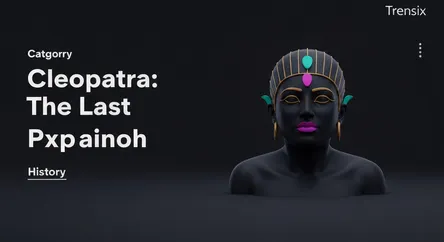History
Cleopatra: The Last Pharaoh Explained

Discover Cleopatra VII, the brilliant and powerful last pharaoh of Egypt, whose intelligence and political savvy left an indelible mark on history.
What is it?
Cleopatra VII Philopator was the last active ruler of the Ptolemaic Kingdom of Egypt. A member of a Macedonian Greek dynasty, she was known for her formidable intellect, political shrewdness, and charisma. Highly educated, Cleopatra was the first Ptolemaic ruler to learn and speak the Egyptian language, along with several others. She navigated a complex political landscape by forming crucial alliances with powerful Roman leaders, most notably Julius Caesar and Mark Antony, with whom she had children. Her reign was marked by efforts to strengthen Egypt's economy and maintain its independence against the expanding power of Rome.
Why is it trending?
Cleopatra's story of power, romance, and tragedy has captivated audiences for centuries, inspiring works by Shakespeare and numerous Hollywood films. She remains a trending topic due to her enduring cultural presence and recent controversies. Debates over her ethnicity and casting in modern productions have sparked widespread discussion online. Furthermore, her life is a subject of continuous academic fascination and is frequently featured in new documentaries and media, ensuring she remains a prominent figure in public consciousness. Her complex legacy as a powerful female ruler continues to be re-examined and debated.
How does it affect people?
Cleopatra's legacy influences modern culture in various ways. She is a timeless symbol of female power, intelligence, and resilience, challenging historical narratives often dominated by men. Her iconic style has a lasting impact on fashion and beauty, with trends like the "cat-eye" makeup directly linked to her image. In popular culture, she is often depicted as the archetypal femme fatale, though modern interpretations increasingly focus on her skills as a diplomat, scholar, and leader. Her story forces conversations about historical representation, cultural appropriation, and the complexities of power in both the ancient and modern worlds.